- Home
- Gayle Forman
Just One Day Page 17
Just One Day Read online
Page 17
Page 17
I run into the street. The cars honk at me, their horns strange and foreign sounding, as if even they speak another language. I spin around, having absolutely no idea where I am, no idea where to go, but desperately wanting to be home. Home in my bed. Safe.
The tears make it hard to see, but somehow I stumble across the street, down the sidewalk, ricocheting from block to block. This time no one is chasing me. But this time I am scared.
I run for several blocks, up a bunch of stairs and onto a square of sorts, with a rack of those gray-white bicycles, a real estate agency, a pharmacy, and a café, in front of which is a phone booth. Melanie! I can call Melanie. I take some deep breaths, swallow my sobs, and follow the instructions to get the international operator. But the call goes straight to voice mail. Of course it does. She left the phone off to avoid calls from my mother.
An operator comes on the line to tell me I can’t leave a message because the call is collect. I start to cry. The operator asks me if she should call the police for me. I hiccup out a no, and she asks if perhaps there is someone else I might call. And that’s when I remember Ms. Foley’s business card.
She picks up with a brisk “Pat Foley. ” The operator has to ask her if she’ll accept the collect call three times because I start crying harder the minute she answers, so she can’t hear the request.
“Allyson. Allyson. What’s the matter? Are you hurt?” she asks over the line.
I’m too scared, too numb to be hurt. That will come later.
“No,” I say in the tiniest of voices. “I need help. ”
Ms. Foley manages to pull the basics out of me. That I went to Paris with a boy I met on the train. That I’m stuck here, lost, with no money, no clue where I am.
“Please,” I beg her. “I just want to go home. ”
“Let’s work on getting you back to England, shall we?” she says calmly. “Do you have a ticket?”
Willem bought me a round trip, I think. I rifle through my bag and pull out my passport. The ticket is still folded neatly inside. “I think so,” I tell Ms. Foley in a quivery voice.
“When is the return booked for?”
I look at it. The numbers and dates all swim together. “I can’t tell. ”
“Top left corner. It’ll be in military time. The twenty-four-hour clock. ”
And there I see it. “Thirteen-thirty. ”
“Thirteen-thirty,” Ms. Foley says in that comfortingly efficient voice of hers. “Excellent. That’s one-thirty. It’s just past noon now in Paris, so you have time to catch that train. Can you get yourself to the train station? Or to a Metro?”
I have no idea how. And no money. “No. ”
“How about a taxi? Take a taxi to the Gare du Nord?”
I shake my head. I don’t have any euros to pay for a taxi. I tell Ms. Foley that. I can hear the disapproval in her silence. As if nothing I’ve told her before has lowered me in her esteem, but coming to Paris without sufficient funds? She sighs. “I can order you a taxi from here and have it prepaid to bring you to the train station. ”
“You can do that?”
“Just tell me where you are. ”
“I don’t know where I am,” I bellow. I paid absolutely no attention to where Willem took me yesterday. I surrendered.
“Allyson!” Her voice is a slap across the face, and it has just the intended effect. It stops my caterwauling. “Calm down. Now put the phone down for a moment and go write down the nearest intersection. ”
I reach into my bag for my pen, but it’s not there. I put the phone down and memorize the street names. “I’m at Avenue Simon Bolivar and Rue de l’Equerre. ” I’m butchering the pronunciation. “In front of a pharmacy. ”
Ms. Foley repeats back the information, then tells me not to move, that a car will be there within a half hour and that I’m to call her back if one doesn’t arrive. That if she doesn’t hear from me, she will assume that I will be on the one-thirty train to St. Pancras, and she will meet me in London right at edge of the platform at two forty-five. I’m not to leave the train station without her.
Fifteen minutes later, a black Mercedes cruises up to the corner. The driver holds a sign, and when I see my name—Allyson Healey—I feel both relieved and bereft. Lulu, wherever she came from, is truly gone now.
I slide into the backseat, and we take off for what turns out to be all of a ten-minute drive to the train station. Ms. Foley has arranged for the driver to take me inside, to show me right where to board. I’m in a daze as we make our way through the station, and it’s only when I am slumped into my seat and I see people wheeling bags through the aisles that I realize that I’ve left my suitcase at the club. All my clothes and all the souvenirs from the trip are in there. And I don’t even care. I have lost something far more valuable in Paris.
I keep it together until the train goes into the Tunnel. And then maybe it’s the safety of the darkness or the memory of yesterday’s underwater journey that sets everything loose, but once we leave Calais and the windows darken, I again start to quietly sob, my tears salty and endless as the sea I’m traveling through.
At St. Pancras, Ms. Foley escorts me to a café, stations me at a corner table, and buys me tea that grows cold in its cup. I tell her everything now: The underground Shakespeare play in Stratford-upon-Avon. Meeting Willem on the train. The trip to Paris. The perfect day. His mysterious disappearance this morning that I still do not understand. My panicked flight.
I expect her to be stern—disapproving, for deceiving her, for being such a not-good girl—but instead she is sympathetic.
“Oh, Allyson,” she says.
“I just don’t know what could’ve happened to him. I waited and waited for a few hours at least, and I got so scared. I panicked. I don’t know, maybe I should’ve waited longer. ”
“You could’ve waited until next Christmas, and I scarcely imagine it would have done a spot of good,” Ms. Foley says.
I look at her. I can feel my eyes beseeching.
“He was an actor, Allyson. An actor. They are the worst of the lot. ”
“You think the whole thing was an act? Was fake?” I shake my head. “Yesterday wasn’t fake. ” My voice is emphatic, though I’m no longer sure who I’m trying to convince.
“I daresay it was real in the moment,” she says, measuring her words. “But men are different from women. Their emotions are capricious. And actors turn it on and turn it right back off. ”
“It wasn’t an act,” I repeat, but my argument is losing steam.
“Did you sleep with him?”
For a second, I can still feel him on me. I push the thought away, look at Ms. Foley, nod.
“Then he got what he came for. ” Her words are matter-of-fact, but not unkind. “I imagine he never planned on it being more than a one-day fling. That was exactly what he proposed, after all. ”
It was. Until it wasn’t. Last night, we declared our feelings for each other. I am about to tell Ms. Foley this. But then I stop cold: Did we declare anything? Or did I just lick some spit on myself?
I think about Willem. Really think about him. What do I actually know about him? Only a handful of facts—how old he is, how tall he is, what he weighs, his nationality, except I don’t even know that because he said his mother wasn’t Dutch. He’s a traveler. A drifter, really. Accidents are the defining force in his life.
I don’t know his birthday. Or his favorite color, or favorite book, or favorite type of music. Or if he had a pet growing up. I don’t know if he ever broke a bone. Or how he got the scar on his foot or why he hasn’t been home in so long. I don’t even know his last name! And that’s still more than he has on me. He doesn’t even know my first name!
In this ugly little café, without the romantic gleam of Paris turning everything rose-colored pretty, I begin to see things as they truly are: Willem invited me to Paris for one day. He never promised me anythin
g more. Last night, he’d even tried to send me home. He knew Lulu wasn’t my real name, and he made absolutely no attempt to ever find out who I really was. When I’d mentioned texting or emailing him the picture of the two of us, he’d cleverly refused to give out his contact details.
And it wasn’t like he’d lied. He said he’d fallen in love many times, but had never been in love. He’d offered it up about himself. I think of the girls on the train, Céline, the models, the girl at the café. And that was just in a single day together. How many of us were out there? And rather than accept my lot and enjoy my one day and move on, I’d dug in my heels. I’d told him I was in love with him. That I wanted to take care of him. I’d begged for another day, assumed he wanted it too. But he never answered me. He never actually said yes.
Oh, my God! It all makes sense now. How could I have been so naïve? Fall in love? In a day? Everything from yesterday, it was all fake. All an illusion. As reality crystallizes into place, the shame and humiliation make me so sick, I feel dizzy. I cradle my head in my hands.
Ms. Foley reaches out to pat my head. “There, there, dear. Let it out. Predictable, yes, but still brutal. He could have at least seen you off at the train station, waved you away and then never called again. A bit more civilized. ” She squeezes my hand. “This too shall pass. ” She pauses, leans in closer. “What happened to your neck, dear?”
My hand flies up to my neck. The bandage has come off, and the scabby cut is starting to itch. “Nothing,” I say. “It was an . . . ” I’m about to say accident, but I stop myself. “A tree. ”
“And where’s your lovely watch?” she asks.
I look down at my wrist. I see my birthmark, ugly, naked, blaring. I yank down my sweater sleeve to cover it. “He has it. ”
She clucks her tongue. “They’ll do that, sometimes. Take things as a sort of trophy. Like serial killers. ” She takes a final slurp of her tea. “Now, shall we take you to Melanie?”
I hand Ms. Foley the scrap of paper with Veronica’s address, and she pulls out a London A–Z book to chart our way. I fall asleep on the Tube, my tears wrung out, the blankness of exhaustion the only comfort I have now. Ms. Foley shakes me awake at Veronica’s stop and leads me to the redbricked Victorian house where her flat is.
Melanie comes bounding to the door, already dressed up for tonight’s trip to the theater. Her face is lit up with anticipation, waiting to hear a really good story. But then she sees Ms. Foley, and her expression skids. Without knowing anything, she knows everything: She bid Lulu farewell at the train station yesterday, and it’s Allyson being returned to her like damaged goods. She gives the slightest of nods, as if none of this surprises her. Then she kicks off her heels and opens her arms to me, and when I step into them, the humiliation and heartbreak bring me to my knees. Melanie sinks to the ground alongside me, her arms hugging me tight. Behind me, I hear Ms. Foley’s retreating footsteps. I let her leave without saying a word. I don’t thank her. And I already know that I never will, and that is wrong considering the great kindness she’s done me. But if I am to survive, I can never, ever visit this day again.
PART TWO
One Year
Fourteen
SEPTEMBER
College
Allyson. Allyson. Are you there?”
I pull the pillow over my head and scrunch my eyes shut, faking sleep.
The key turns in the lock as my roommate Kali pushes open the door. “I wish you wouldn’t lock the door when you are here. And I know you’re not asleep. You’re just playing dead. Like Buster. ”
Buster is Kali’s dog. A Lhasa apso. She has pictures of him among the dozens tacked up on the wall. She told me all about Buster last July when we had our initial howdy-roommate phone call. Back then, I thought Buster sounded cute, and I found it quirky that Kali was named for her home state, and the way she talked—as if she were punching her words somehow—seemed sweet.

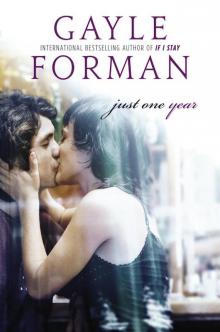 Just One Year
Just One Year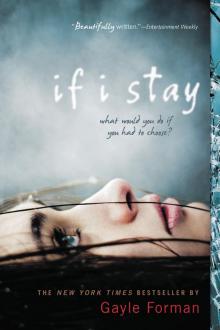 If I Stay
If I Stay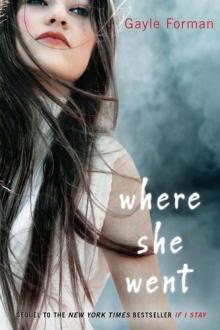 Where She Went
Where She Went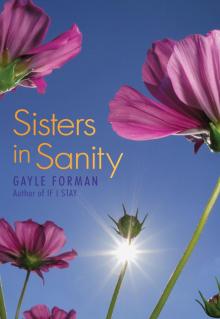 Sisters in Sanity
Sisters in Sanity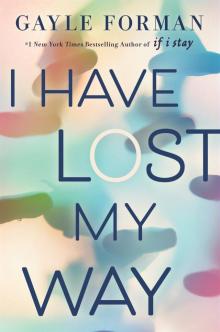 I Have Lost My Way
I Have Lost My Way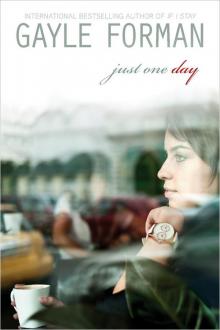 Just One Day
Just One Day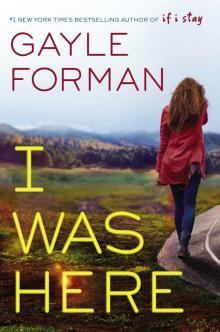 I Was Here
I Was Here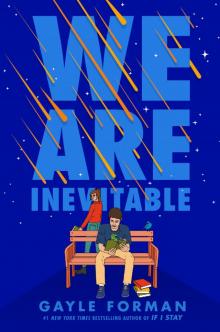 We Are Inevitable
We Are Inevitable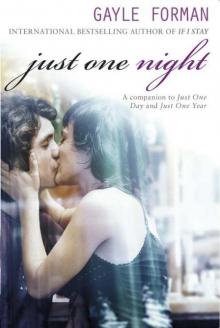 Just One Night
Just One Night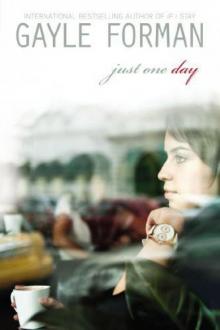 Just One Day jod-1
Just One Day jod-1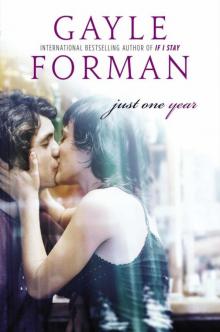 Just One Day 02: Just One Year
Just One Day 02: Just One Year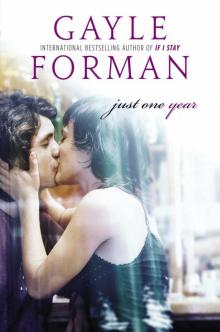 Just One Year jod-2
Just One Year jod-2